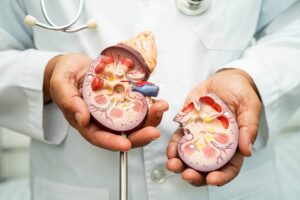
Acute kidney injury is a sudden and severe decline in kidney function. It is quite common among older adults and is known to increase the chances of illness and death. Previous research has hinted that there might be some connection between brain injury and AKI, but this new study specifically looked at how AKI might be related to different types of dementia.
The researchers examined data from over 300,000 individuals aged 65 and older. This data was taken from the Sweden-based SCREAM (Stockholm CREAtinine Measurement) project. Over an average period of 12 years, about one in four of these individuals experienced at least one episode of AKI, and 16 percent of them were diagnosed with some form of dementia.
The study found that people who had suffered from acute kidney injury were 49 percent more likely to develop any form of dementia compared to those who had not. When the researchers looked at specific types of dementia, they found that the risk for dementia caused by Parkinson’s disease or Lewy body dementia was 88 percent higher.
They also found that for vascular dementia, it was 47 percent higher, and for Alzheimer’s disease, it was 31 percent higher. The risk of developing dementia was even more significant for those who had severe kidney damage that required hospitalization.
Assistant Professor Hong Xu from the Department of Neurobiology, Care Sciences and Society at Karolinska Institutet, along with Professor Juan Jesus Carrero from the Karolinska Institutet’s Department of Medical Epidemiology and Biostatistics, suggested that AKI might not only affect kidney function but could also have broader impacts on brain health.
They believe that identifying AKI as a risk factor for dementia could lead to earlier interventions, preventive treatments, and improved patient care. This could potentially help in slowing down or preventing the development of dementia in those who have experienced acute kidney injury.
The next step for the researchers is to explore how AKI and dementia are connected at the biological level. They also plan to study whether certain medications, changes in lifestyle, and careful monitoring after an episode of AKI can lower the chances of developing dementia.
Several organizations, including StratNeuro, CIMED, KI foundations, and the Swedish Research Council supported the study. Additionally, Yang Xu, a researcher at Peking University Health Science Center and Karolinska Institutet, received funding from the Young Scientists Fund and the National Natural Science Foundation of China to support this research.